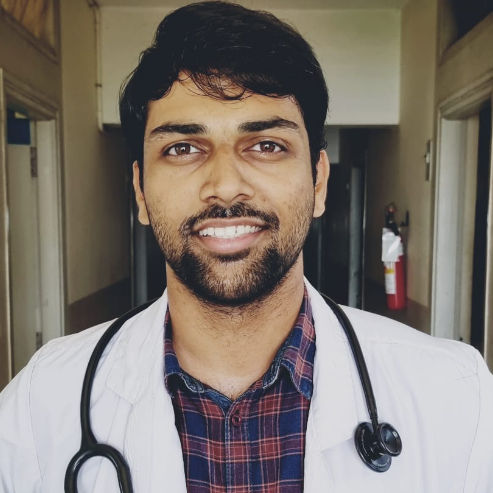Consult Geriatricians Online - Geriatric Medicine Doctors (51 doctors)

Dr. Anuradha V
Dentist
30 Years • BDS, MDS (Oral & Maxillo Facial Surgery )
Bengaluru
Comprehensive Dental & Implant Centre, Bengaluru

Dr Darshana R
General Physician/ Internal Medicine Specialist
15 Years • MBBS, MD, DNB (Internal Medicine), Diploma in Allergy, Asthma and Immunology , Fellowship in Diabetes
Bengaluru
Apollo Clinic, JP nagar, Bengaluru
100+ recommendations

Dr. Renu Saraogi
General Physician/ Internal Medicine Specialist
21 Years • MBBS, PGDFM
Bangalore
Apollo Clinic Bellandur, Bangalore
200+ recommendations

Dr. E Prabhakar Sastry
General Physician/ Internal Medicine Specialist
40 Years • MD(Internal Medicine)
Manikonda Jagir
Apollo Clinic, Manikonda, Manikonda Jagir
50+ recommendations

Dr Vishwa Vijeth K.
Pulmonology Respiratory Medicine Specialist
8 Years • MBBS, MD ( Respiratory Medicine)
Bangalore
Apollo Clinic Bellandur, Bangalore

Dr Shivakumar M P
General Physician/ Internal Medicine Specialist
31 Years • MBBS MD
Bengaluru
Apollo Clinic, JP nagar, Bengaluru

Dr. Jyothi Rajesh
Obstetrician and Gynaecologist
22 Years • MBBS, DGO(DNB)
Bangalore
Apollo Clinic Bellandur, Bangalore
100+ recommendations

Dr Venkata Naga Sai Tribhushan Rambhatla
General Physician
3 Years • MBBS
Bengaluru
PRESTIGE SHANTHINIKETAN - SOCIETY CLINIC, Bengaluru

Dr. Suresh G
General Physician/ Internal Medicine Specialist
25 Years • MBBS, MD
Bangalore
Apollo Clinic Bellandur, Bangalore
200+ recommendations
Dr. Naseeha Mohammed S V
Pulmonology Respiratory Medicine Specialist
6 Years • MBBS, MD ,DNB Respiratory Medicine
Bengaluru
Apollo Clinic, Sarjapur Road, Bengaluru
Dr Preeti
General Physician/ Internal Medicine Specialist
17 Years • MBBS, PGDHHM
Bangalore
Apollo Clinic Bellandur, Bangalore

Dr. Chaithanya R
Internal Medicine Specialist Diabetologist
16 Years • MBBS, MD Internal Medicine, Fellowship in Diabetes(UK), CCEBDM(PHFI)
Bangalore
Apollo Clinic Bellandur, Bangalore

Dr Vishwa Vijeth K.
Pulmonology Respiratory Medicine Specialist
8 Years • MBBS, MD ( Respiratory Medicine)
Bengaluru
Apollo Medical Center, Marathahalli, Bengaluru

Dr. Akshatha Manjunath
General Surgeon
8 Years • MBBS, MS
Bangalore
Apollo Clinic Bellandur, Bangalore

Ms. Suman Sharma
Physiotherapist And Rehabilitation Specialist
9 Years • BPT MPT
Bengaluru
Apollo Clinic, JP nagar, Bengaluru
Book Consult for Elderly Care and Concerns (Geriatrics) Online
Booking an appointment with a top geriatrician at Apollo 24|7 is just a few clicks away. Our user-friendly platform allows you to easily schedule online or physical consultations with experienced geriatric specialists at trusted hospitals and clinics. We offer convenient appointment slots that fit your schedule, ensuring you receive the best care for age-related health concerns. With Apollo 24|7, you have access to a wide network of skilled geriatricians who are dedicated to improving the quality of life for older adults. Don't wait; book your appointment today and take the first step towards optimal health in your golden years.
What is Geriatrics?
Geriatrics is a medical speciality focused on the health care of elderly people. It aims to promote health by preventing and treating diseases and disabilities in older adults. This branch of medicine is critical as it addresses the complex needs of an ageing population, which are often characterised by the presence of multiple health issues and the use of various medications.
The relevance of geriatrics in healthcare is profound, especially as populations worldwide are experiencing a significant increase in life expectancy.
Geriatricians, therefore, play a pivotal role in enhancing the quality of life for the elderly, ensuring they receive comprehensive and coordinated care that addresses their unique medical, social, and psychological needs.
Who is a Geriatrician?
A geriatrician is a medical doctor who has specialised in the care of older adults. To become a geriatrician, one must complete medical school followed by a residency in internal medicine or family medicine. After this, further specialisation in geriatrics through a fellowship is required, during which doctors gain extensive experience in managing the complex health issues that predominantly affect the elderly.
Geriatricians are equipped to handle a wide range of conditions that may affect older adults, including Alzheimer’s disease, arthritis, osteoporosis, cardiovascular diseases, and incontinence.
Their expertise also extends to managing multiple medications and treatments, providing palliative care, and addressing the psychological and social challenges associated with ageing. Their specialised training allows them to evaluate and create comprehensive treatment plans that improve their patients' overall quality of life.
What Does a Geriatrician Do?
A geriatrician specialises in the healthcare of elderly patients, focusing on maintaining their independence and managing multiple chronic conditions effectively. Their work is pivotal in managing the complexities associated with ageing.
Key Responsibilities:
Comprehensive Assessments: Conducting detailed assessments that include physical, mental, functional, and social aspects to develop a tailored care plan.
Management of Chronic Diseases: Geriatricians are experts in managing chronic diseases such as diabetes, heart disease, and dementia, which are more prevalent in older adults.
Medication Management: They review and manage multiple medication regimens to reduce the risk of adverse drug interactions and side effects.
Preventative Care: Providing vaccinations and screenings specifically relevant to older adults to prevent illnesses and complications.
Daily Activities:
Patient Consultations: They spend significant time consulting with patients and their families about the management of their conditions and the best practices for staying healthy.
Interdisciplinary Coordination: Collaborating with other healthcare professionals such as nurses, social workers, and physical therapists to provide a holistic approach to patient care.
Patient Monitoring: They monitor the progress of their patients over time, making adjustments to treatments as necessary to adapt to changing health conditions.
Education and Advocacy: Educating patients and their families on the challenges of ageing, and advocating for elder-friendly policies and practices within the healthcare system.
What are the Other Sub-specialities of Geriatrics?
Geriatrics encompasses a range of sub-specialities dedicated to the multifaceted needs of older adults. Each sub-speciality addresses different aspects of ageing, helping to enhance the overall care and quality of life for the elderly.
Geriatric Medicine: This core speciality involves comprehensive healthcare planning and management for older adults, focusing on the prevention, diagnosis, and treatment of diseases. The geriatric doctor works in various settings, including hospitals, nursing homes, and outpatient clinics.
Geriatric Psychiatry: Specialising in the mental health of the elderly, this sub-speciality addresses issues like depression, anxiety, and the cognitive impacts of ageing. A dementia specialist plays a crucial role here, especially in managing behavioural changes associated with dementia and Alzheimer's treatment.
Palliative Care: This area focuses on providing relief from the symptoms and stress of serious illnesses. It aims to improve the quality of life for both patients and their families.
Geriatric Rehabilitation: Tailored rehabilitation services to help elderly patients regain or maintain their physical abilities, thereby enhancing independence following illness or injury.
Memory Care: Specifically designed for individuals with memory impairments, this care includes structured activities and therapies to support those with Alzheimer's or other forms of dementia.
Palliative and Hospice Care: While palliative care can be provided at any stage of illness, hospice care is specific to the end of life, offering compassionate care to patients and support to their families.
Pain Management in the Elderly: This sub-speciality focuses on reducing pain and improving quality of life through various treatments and therapies, considering the unique needs of the elderly.
Geriatric Nutrition: Addresses nutritional challenges and dietary needs of the elderly to maintain their health and wellness.
Elder Abuse Prevention and Intervention: This critical area focuses on protecting the elderly from physical, emotional, and financial abuse. It includes legal and social services interventions.
Home Health Care Services: These services provide medical and personal care support in the comfort of the patient’s home, allowing for continued independence. An elderly care specialist oversees the development and implementation of personalised care plans.
Each of these sub-specialities plays a vital role in creating a comprehensive care system that addresses the unique challenges faced by older adults.
What are the Geriatrics Examinations or Tests Performed by the Geriatrician?
A geriatrician performs a variety of diagnostic tests and examinations to assess the health and functional status of elderly patients. These assessments help tailor individual care plans and manage various aspects of ageing effectively.
Here are some of the most common diagnostic tools used in geriatrics:
Comprehensive Geriatric Assessment (CGA): This is a multidimensional, multidisciplinary diagnostic process designed to determine a patient’s medical, psychological, and functional capabilities. It helps in developing a coordinated and integrated plan for treatment and long-term follow-up.
Memory Tests: Used to evaluate cognitive function, these tests are crucial for diagnosing conditions like dementia or Alzheimer's disease. They typically assess memory, problem-solving skills, and language abilities.
Mobility Tests: These assessments measure how well an elderly person can move and maintain balance, which is vital for planning rehabilitative or supportive care. Common tests include the Timed Up and Go (TUG) test and the gait speed test.
Bone Density Scan: Often conducted to detect osteoporosis, a condition prevalent in older adults, this test measures bone strength and the likelihood of fractures.
Blood Tests: Comprehensive blood panels are performed to check for a variety of issues such as vitamin deficiencies, electrolyte imbalances, kidney function, and signs of infection or other diseases.
Cardiovascular Tests: These might include an electrocardiogram (EKG) to measure heart rate and rhythm, or an echocardiogram to assess heart function.
Depression Screening: Mental health is as critical as physical health; thus, geriatricians often perform screenings for depression and anxiety, conditions common in the elderly due to various psychosocial changes associated with ageing.
Medication Review: This is a critical examination where the geriatrician reviews all medications a patient is taking to ensure there are no potential interactions or side effects that could impact the patient’s health.
If you or a loved one needs thorough and considerate care from a specialist who understands the complexities of ageing, it might be time to book geriatrician services. These professionals are dedicated to improving the health and quality of life for older adults through tailored assessments and treatments.
What are the Common Conditions & Diseases that Geriatricians Treat?
Geriatricians specialise in managing various diseases and conditions that commonly affect elderly patients. Here is a list of the top 15 conditions they treat:
Alzheimer's Disease: A progressive neurological disorder that causes brain cells to waste away, leading to a decline in cognitive function.
Parkinson's Disease: A degenerative disorder of the central nervous system that affects movement, causing tremors, stiffness, and difficulty with balance and coordination.
Arthritis: Inflammation of the joints, leading to pain and limited function.
Osteoporosis: A bone disease that occurs when the body loses too much bone, makes too little bone, or both, leading to fragile bones.
Heart Disease: A range of conditions affecting the heart, including coronary artery disease, heart attacks, and heart failure.
Diabetes: A chronic condition that affects the way the body processes blood sugar (glucose).
Hypertension: High blood pressure, a common condition that can lead to severe complications if not managed.
Chronic Obstructive Pulmonary Disease (COPD): A chronic inflammatory lung disease that causes obstructed airflow from the lungs.
Dementia: A general term for a decline in mental ability severe enough to interfere with daily life.
Depression: A common and serious medical illness that negatively affects how you feel, the way you think, and how you act.
Urinary Incontinence: Involuntary leakage of urine, a common and often embarrassing problem.
Falls: Elderly are at a higher risk of falls, which can result in severe injuries.
Stroke: A condition where poor blood flow to the brain results in cell death.
Vision and Hearing Loss: Age-related changes in vision and hearing can significantly affect quality of life.
Malnutrition: Common in older adults, often due to poor diet and challenges in meal preparation.
Reasons to See a Geriatrician
Visiting a geriatrician is essential for managing complex health issues associated with ageing. Here are the primary reasons for consulting these specialists:
Multiple Medications: Reviewing and managing multiple prescriptions to minimise side effects and interactions.
Memory Issues: Addressing concerns about memory loss or behavioural changes, which could indicate dementia or Alzheimer's.
Mobility Problems: Assessing and treating falls, balance issues, and frailty.
Chronic Condition Management: Coordinating care for chronic conditions like diabetes and hypertension.
General Age-Related Concerns: Evaluating age-related physiological changes, including incontinence and sensory impairments.
For those unable to visit a doctor in person, online geriatrician consultation offers a convenient way to access specialised care from the comfort of your home.
What Types of Procedures do Geriatricians Perform?
Geriatricians are specialists who focus on the care of elderly patients, offering a variety of procedures that are often divided into therapies and surgeries to manage various age-related conditions. These procedures are essential for enhancing the quality of life and maintaining the health of older adults.
Top Therapies:
Physical Therapy: Tailored exercises to strengthen muscles, improve mobility, and decrease pain.
Cognitive Behavioral Therapy (CBT): Used primarily to treat depression, anxiety, and certain phobias.
Occupational Therapy: Helps in improving daily activities like dressing, eating, and bathing to promote independence.
Speech Therapy: Assists with communication disorders and swallowing difficulties.
Nutritional Management: Developing personalised dietary plans to manage or prevent chronic illnesses.
Pain Management Programs: Utilising medications, physical modalities, and psychological techniques to manage pain.
Fall Prevention Training: Strategies to improve balance and prevent falls.
Memory Enhancement Programs: Therapies aimed at improving cognitive function and supporting dementia care.
Medication Management: Adjusting and managing medication regimes to optimise health and reduce side effects.
Top Surgeries:
Pacemaker Installation: Device placement to help control abnormal heart rhythms.
Cataract Surgery: Removal of the clouded lens of the eye to improve vision.
Joint Replacement: Surgical replacement of a joint, usually the hip or knee, to alleviate severe arthritis pain.
Fracture Repairs: Surgical treatment of breaks typically caused by osteoporosis.
Minor Excisions: Removal of small skin lesions or tumours that are more common in older patients.
Each procedure performed by a geriatrician is aimed at addressing specific challenges faced by the elderly, ensuring a holistic approach to their healthcare. Managing these procedures efficiently often requires understanding the complex needs of older adults, which can influence the geriatrician fee associated with their specialised services.
Why Choose an Apollo 24|7 Geriatrician?
Geriatricians at Apollo 24|7 are distinguished by their expertise, qualifications, and experience in managing the complex medical needs of older adults. They provide personalised care, tailoring treatment plans to consider the patient's overall health, functional status, and quality of life.
With access to the latest treatments and technologies, Apollo 24|7 geriatricians ensure comprehensive care for their patients. Convenient consultations are available both online and in-clinic, making healthcare more accessible and flexible for older adults and their caregivers.
What to Expect When Visiting a Geriatrician?
Visiting a geriatrician can be a crucial step for elderly individuals seeking comprehensive healthcare. These specialists are adept at managing multiple aspects of ageing, providing a tailored approach to each patient's needs.
Comprehensive Assessment: Initial visits typically involve a thorough assessment covering medical history, physical, cognitive, and functional evaluations to outline an effective care plan.
Discussion of Health Concerns: Patients can discuss their current health issues, medications, and any cognitive concerns, ensuring all aspects of their health are addressed.
Development of a Personalised Care Plan: Based on the assessment, the geriatrician will develop a treatment plan that may include medications, therapies, and lifestyle adjustments.
Regular Follow-Ups: Monitoring and adjusting the care plan as necessary, with regular follow-ups to assess progress and make changes if needed.
Patients looking for specialised elderly care should consider searching for a geriatrician near me to find a qualified professional who can cater to their specific health needs. Reading geriatrician reviews can also provide insights into the experiences of other patients, helping to choose the right specialist.
How Can I Get an Appointment With a Geriatrician?
To book an appointment with a geriatrician at Apollo 24|7, you can:
Book Online: Visit the Apollo 24|7 website and navigate to the "Specialities" section. Select "Geriatrics" and choose a geriatrician from the list of available doctors. Follow the prompts to select a date and time for your consultation.
Book Through the App: Download the Apollo 24|7 app on your smartphone. Log in or create an account, then select "Specialities" and choose "Geriatrics". Pick a geriatrician and follow the steps to schedule your appointment.
Call the Helpline: If you prefer to book over the phone, call the Apollo 24|7 helpline number and speak with a representative. They will assist you in finding a suitable geriatrician and scheduling your appointment.
FAQs
What is geriatrics?
Geriatrics is a medical speciality focusing on the healthcare needs of older adults, typically those above 60 years. It involves comprehensive care, including diagnosing, treating, and preventing health problems specific to the elderly population. Geriatricians are specially trained doctors who provide this care, aiming to improve the quality of life for seniors.
Who are geriatricians and what do they do?
Geriatricians are physicians who specialise in caring for the elderly. They diagnose and treat illnesses, monitor medication side effects, evaluate physical and mental health, provide medical advice, and coordinate care with other healthcare professionals. Geriatricians complete additional training after becoming certified in family or internal medicine to gain expertise in geriatric care.
What kind of health issues do geriatricians address?
Geriatricians handle a wide range of health concerns in older adults, including chronic conditions like diabetes and heart disease, bone health issues such as osteoporosis, mobility problems, sensory decline, cognitive issues like dementia and memory loss, and emotional concerns such as anxiety and depression. They provide comprehensive care to address these diverse needs.
When should an elderly person consult a geriatrician?
An elderly individual should consider seeing a geriatrician if they take multiple medications for chronic conditions, experience memory issues or dementia symptoms, have mobility problems, or show warning signs like frailty and appetite loss. Regular visits to a geriatrician can help prevent hospitalisation by addressing health concerns proactively.
How do geriatricians work with other healthcare professionals?
Geriatricians collaborate with an interdisciplinary team to provide comprehensive geriatric care. This team includes nurses who assist with daily activities and wound care, social workers, care managers, pharmacists, physical and occupational therapists who help maintain independence, nutritionists, and mental health professionals who address emotional and cognitive issues in older patients.
What is the recommended frequency of doctor visits for the elderly?
Regular doctor visits are crucial for elderly individuals to constantly evaluate their health status. The frequency of these check-ups may vary based on individual health needs, but generally, older adults should see their geriatrician or primary care physician at least once a year, if not more frequently, to monitor chronic conditions and address any new concerns promptly.
Why are functional, cognitive, and physical assessments important in geriatric care?
Geriatricians perform functional, cognitive, and physical assessments to evaluate an elderly patient's ability to carry out daily tasks, screen for conditions like dementia and depression, and assess risks for common age-related issues such as incontinence, osteoporosis, sensory loss, malnutrition, fall injuries, hypertension, and diabetes. These assessments help devise personalised care plans.
How do geriatricians manage medications for older patients?
Geriatricians closely monitor their patients' medication regimens to watch for side effects, potential drug interactions, and to weigh the benefits against the risks. They review and adjust medications as needed to ensure safe and effective treatment, considering the unique physiological changes and sensitivities of the ageing body.
What role do geriatricians play in advance care planning?
Geriatricians often initiate discussions about advance care planning with their elderly patients, including long-term care options, hospice care, and supportive living arrangements. They may advise on transitioning to assisted living facilities or giving up certain activities like driving, ensuring that patients' wishes are respected and their needs are met.
How can geriatric care improve the quality of life for older adults?
Geriatric care provided by skilled geriatricians can significantly improve the quality of life for older adults by addressing their unique health needs, managing chronic conditions, optimising medication regimens, and providing guidance on maintaining independence and safety. By focusing on preventive care and early intervention, geriatricians help seniors age gracefully and comfortably.